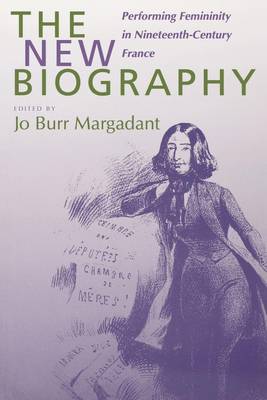
Bedankt voor het vertrouwen het afgelopen jaar! Om jou te bedanken bieden we GRATIS verzending (in België) aan op alles gedurende de hele maand januari.
- Afhalen na 1 uur in een winkel met voorraad
- In januari gratis thuislevering in België
- Ruim aanbod met 7 miljoen producten
Bedankt voor het vertrouwen het afgelopen jaar! Om jou te bedanken bieden we GRATIS verzending (in België) aan op alles gedurende de hele maand januari.
- Afhalen na 1 uur in een winkel met voorraad
- In januari gratis thuislevering in België
- Ruim aanbod met 7 miljoen producten
Zoeken
The New Biography
Performing Femininity in Nineteenth-Century France Volume 38
€ 54,45
+ 108 punten
Omschrijving
The New Biography looks at the life stories of eight famous women in nineteenth-century France who became public figures even though they lived in a society that did not encourage women to speak out publicly. All of these women--activists, writers, and philosophers--became controversial figures who challenged conventional notions of femininity in their time. By showing how these women deliberately created their public lives, Jo Burr Margadant and her colleagues demonstrate the rich rewards of the new methods in biography.
In her introduction Margadant gives a brilliant explanation of the new biography and how it fits into recent and current debates about the writing of history. Each essay that follows connects the lives of the women it discusses with major themes in French history. The famous activist Flora Tristan, the feminist journalist Marguerite Durand, and a leading advocate of birth control, Nelly Roussell, are just a few of the fascinating women brought to life in this book.
Because these stories often expose the cracks in what has been seen as a monolithic separation of gendered spheres in nineteenth-century bourgeois France, they challenge historians to rethink assumptions about the history of this period. The New Biography thus joins a body of work that brings women from the margins of the historical record into history's mainstream.
In her introduction Margadant gives a brilliant explanation of the new biography and how it fits into recent and current debates about the writing of history. Each essay that follows connects the lives of the women it discusses with major themes in French history. The famous activist Flora Tristan, the feminist journalist Marguerite Durand, and a leading advocate of birth control, Nelly Roussell, are just a few of the fascinating women brought to life in this book.
Because these stories often expose the cracks in what has been seen as a monolithic separation of gendered spheres in nineteenth-century bourgeois France, they challenge historians to rethink assumptions about the history of this period. The New Biography thus joins a body of work that brings women from the margins of the historical record into history's mainstream.
Specificaties
Betrokkenen
- Uitgeverij:
Inhoud
- Aantal bladzijden:
- 308
- Taal:
- Engels
- Reeks:
- Reeksnummer:
- nr. 38
Eigenschappen
- Productcode (EAN):
- 9780520221413
- Verschijningsdatum:
- 4/09/2000
- Uitvoering:
- Paperback
- Formaat:
- Trade paperback (VS)
- Afmetingen:
- 153 mm x 230 mm
- Gewicht:
- 498 g

Alleen bij Standaard Boekhandel
+ 108 punten op je klantenkaart van Standaard Boekhandel
Beoordelingen
We publiceren alleen reviews die voldoen aan de voorwaarden voor reviews. Bekijk onze voorwaarden voor reviews.








